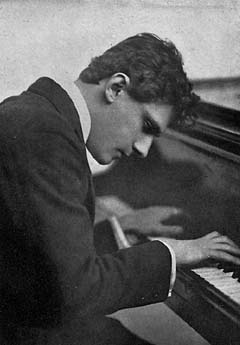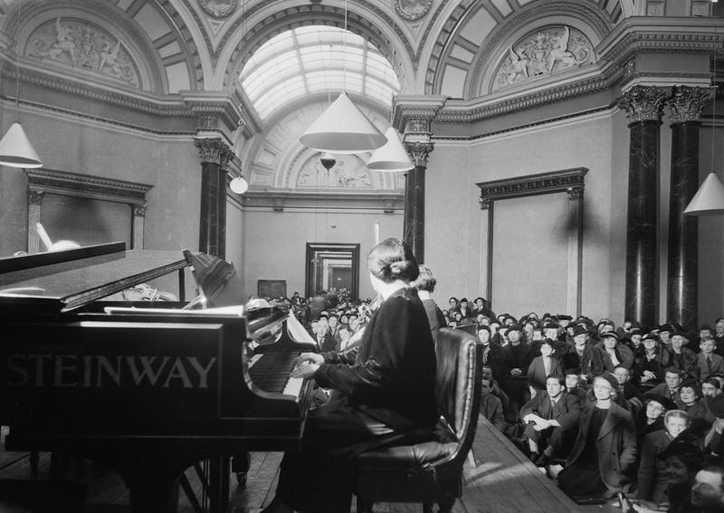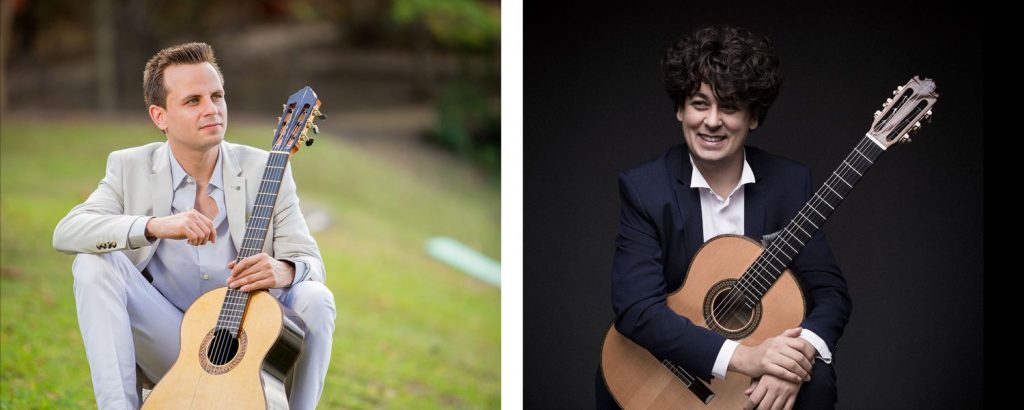by Daniel Hathaway
Visiting Artists: Conductor Philippe Herreweghe and cellist Jean-Guihen Queyras join The Cleveland Orchestra in Beethoven & Haydn on Saturday at 8, and Sunday at 3 (read our Plain Dealer review here), the classical guitar duo of Hermelindo Ruiz and Samuel Diz (pictured) will be hosted by Cleveland Classical Guitar Society at the Maltz Saturday at 7:30), and organist William Porter plays at the Church of the Covenant Sunday at 4.
Other interesting events: soprano Sonya Headlam & pianist Joshua Konow perform music by Black composers Saturday at 7 at The Federated Church, and there are Oberlin Faculty Recitals by Dmitry Kouzov, cello & Thomas Bandy, piano on Saturday at 7:30 in Kulas Recital Hall & by pianist Tony Weinstein on Sunday at 4:30 in Warner Concert Hall, and guitarist Jason Vieaux will play on the Music from the Western Reserve Series in Hudson on Sunday at 5.
Click here to visit the ClevelandClassical.com Concert Listings page for more information.
INTERESTING READS:
Cleveland OpEds
In his regular Saturday newsletter, Plain Dealer editor Chris Quinn gives a nod to the book, The Way We Are, containing 100 opinion pieces by Thomas Bier published by the newspaper between 1977 and 2022. The collection can be downloaded for free on the Cleveland State University Cleveland Memory page.
“Most of the articles concern a current event or issue in the city of Cleveland and/or communities in Northeast Ohio. 100 articles involve 100 topics, varying from local history, to the effect of public policy on communities, to where to locate a new baseball stadium.”
Trigger Warnings?
“As theatrical capabilities allow live performance to reflect extreme violence ever more effectively, Opera Holland Park founder Michael Volpe, OBE? argues that it’s time for opera to follow the world of cinema and warn audiences about what they’re about to witness.” Read ‘Trigger warnings: An act of empathy, not censorship’ in Classical Music U.K. here
WEEKEND ALMANAC:
February 24 — by Mike Telin:

Born sometime between 1892 and 1895 in Kremenchuk, Poltava, in what was then Imperial Russia and what is now central Ukraine, he spent the final 96 years of his life in the U.S. after his family’s immigration in 1906.
Anne Midgette’s obituary for Ornstein for The New York Times is full of colorful details. Describing his divisive compositional style (radical at the time for his use of tone clusters and polyrhythms), she quotes one critic from 1918 who called Ornstein “the only true-blue, genuine Futurist composer alive,” then another who noted the “insufferable hideousness” of his music — or rather his “so-called music.”
Packing concert halls with his performances of works by such composers as Schoenberg, Scriabin, Stravinsky, Bartók, Debussy, Kodály, and Ravel — as well as his own compositions — Ornstein retired from his performing career in 1933. And after the premiere of his Nocturne and Dance of Fate in 1937 by the St. Louis Symphony, he all but vanished from the scene. (Listen to that piece in a recording by Jorge Mester and the Louisville Symphony here.)
“What of Leo Ornstein, bright particular star of American composition a quarter of a century ago?” Midgette writes, quoting the Times’ Olin Downes in 1945. Downes asked three up-and-coming composers about the name Ornstein. The result? “Two of them did not know his name. Twenty-five years ago his name was on the lips of every informed concertgoer.”
A revival of his work took place in the 1970s, and as Ornstein himself told the Times’ Harold Schonberg, “Fame never had much meaning or appeal to me…If my music has any value, it will be picked up and played. If it has no value, it deserves its neglect.”
The final work Ornstein composed was his Eighth Piano Sonata, in 1990 at age 94 — or maybe 96, or 97. Listen here to a recording by Marc-André Hamelin.
February 25 — by Mike Telin:

The pianist may be most remembered for her performances during The Blitz of World War II. During that time Hess organized nearly 2,000 lunchtime concerts in Trafalgar Square’s National Gallery. The concerts were held every Monday and Friday for six-and-a-half years. And every performer was paid five guineas for their services. In 1941 King George VI made Hess a Dame Commander of the Order of the British Empire.
In addition to an active performing career, Hess was a dedicated teacher. One of her students was Clive Lythgoe, the long-time Dean of Faculty at Cleveland’s Music School Settlement.
Hess’s legacy lives on at Chicago’s Seventeenth Church of Christ, Scientist, with its Dame Myra Hess Memorial Concerts. The free lunchtime series is produced by Classical Music Chicago and broadcast live on WFMT (streamed on WFMT.com).
Click here to listen to an interview with Hess, and here for a performance of Chopin’s Waltz No. 1 in E flat Op. 18.




